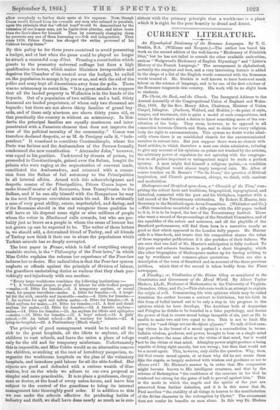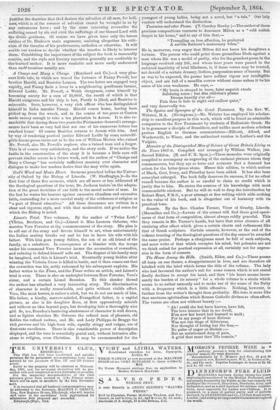A Theodicy ; or, Vindication of the Divine Glory as
manifested in the Constitution and Government of the Moral World. By Albert Taylor Bledsoe, LL.D., Professor of Mathematics in the University of Virginia. (Saunders, Otley, and Co.)—This elaborate work is an attempt to explain the origin of eviL Commencing life with opinions which may be called Arminian the author became a convert to Calvinism, but his faith in this form of belief turned out to ho only a step in his progress to the opinions which he here develops. The doctrines both of Augustine and Pelagius he thinks to be founded in a false psychology, and denies the power of God to create moral beings incapable of sin, just as He is unable to make two and two equal to five. This is not to limit His power, for "such things are not the objects ofpower." To talk of God caus- ing virtue in the breast of a moral agent is a contradiction in terms. Infinite wisdom, goodness, and power, brought to bear on a single mind would produce the same effect as the virtue of that mind, but it would 'not be the virtue of that mind. Almighty power might produce a being capable of doing right merely, but not wrong ; but then that would not be a moral agent. This, however, only shifts the question. Why, then, did God create moral agents, or at least why did he not create them like the angels, so largely endowed with wisdom and goodness as not to choose evil ? Mr. Bledsoe's answer is, in order that His compassion might become known to His intelligent creatures, and that by the scheme of Redemption "the confidence of the creature in his God be rendered too strong for the gates of hell to prevail against him." This is tho mode in which the angels and the spirits of the just are- preserved from further defection, and it is in this sense that St.. Paul ascribes "the stability of all things in heaven to the manifestation of the divine character in the redemption by Christ." The atonement does not confer its benefits on man alone. In this way Dr. Bledsoe Justifies the doctrine that God desires the salvation of all men, for holi- nest which is of. the essence of salvation cannot be wrought in us by any extraneous force ; and by the same reasoning reconciles the suffering caused by sin and even the sufferings of our blessed Lord with the divine goodness. Of coarse we have given hero only the barest outline of Dr. Bledsoo's main argument, omitting altogether his criti- cism of the theories of his predecessors, orthodox or otherwise. It will enable Our readers to decide whether the treatise is likely to interest them. Considering the importance of the subject the book is reasonably
• conciie, and the style and literary execution generally are creditable to thedeainedauthor. It is more readable and more easily understood than auclf treatises usually are.































 Previous page
Previous page